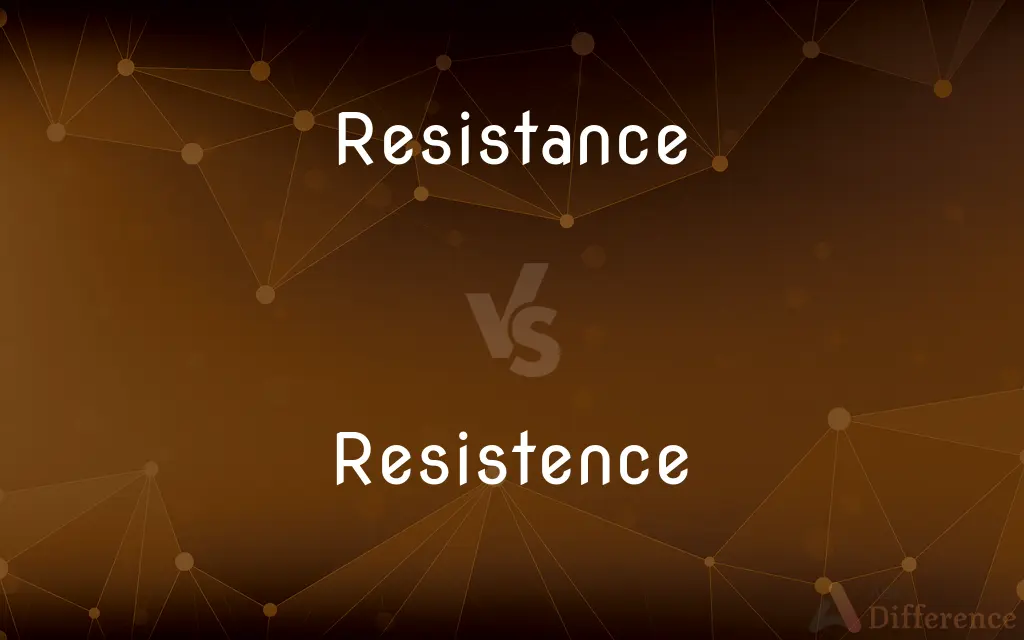Resistance vs. Resistence — Which is Correct Spelling?
By Tayyaba Rehman — Updated on March 19, 2024
"Resistance," meaning opposition to something, is correctly spelled with an "a," while "Resistence" is an incorrect spelling.

Table of Contents
Which is correct: Resistance or Resistence
How to spell Resistance?

Resistance
Correct Spelling

Resistence
Incorrect Spelling
ADVERTISEMENT
Key Differences
Use it Often: Frequent use of “Resistance” in your writing will solidify the correct spelling in memory.
Say it Out Loud: Pronounce it as re-zis-tance, which clearly has an “a.”
Ance not Ence: Remember the correct spelling by noting “ance” at the end, not “ence.”
Rhyme it: “Resistance” rhymes with “distance,” both ending with “ance.”
Resist + ance: Think of the word “resist” and just add “ance” to remember “resistance.”
ADVERTISEMENT
How Do You Spell Resistence Correctly?
Incorrect: I noticed a decrease in resistence when I oiled the machinery.
Correct: I noticed a decrease in resistance when I oiled the machinery.
Incorrect: The resistence of the bacteria to antibiotics is increasing.
Correct: The resistance of the bacteria to antibiotics is increasing.
Incorrect: Resistence is futile against the advancing forces.
Correct: Resistance is futile against the advancing forces.
Incorrect: The resistence offered by the material affects the flow of electricity.
Correct: The resistance offered by the material affects the flow of electricity.
Incorrect: Her resistence to change was notable in the meeting.
Correct: Her resistance to change was notable in the meeting.
Resistance Definitions
Physical Resistance: Opposition to an applied force,
Rubber provides resistance against electricity.
Biological Resistance: Ability to withstand or repel a biological threat,
The plant developed resistance to certain pests.
Psychological Resistance: Mental opposition to specific thoughts or actions,
The patient showed resistance to the therapeutic methods.
Electrical Resistance: Hindrance to the flow of electrical current,
Copper wire has lower electrical resistance than iron wire.
Social/Political Resistance: Opposition to social or political systems,
The resistance against the oppressive regime was widespread.
The refusal to accept or comply with something
They displayed a narrow-minded resistance to change
The ability not to be affected by something, especially adversely
Some of us have a lower resistance to cold than others
The impeding or stopping effect exerted by one material thing on another
Air resistance was reduced by streamlining
The degree to which a substance or device opposes the passage of an electric current, causing energy dissipation. By Ohm's law resistance (measured in ohms) is equal to the voltage divided by the current.
The act or an instance of resisting or the capacity to resist.
A force that tends to oppose or retard motion.
Often Resistance An underground organization engaged in a struggle for national liberation in a country under military or totalitarian occupation.
(Psychology) A process in which the ego opposes the conscious recall of anxiety-producing experiences.
Ability (of an organism, tissue, or cell) to withstand a destructive agent or condition such as a chemical compound, a disease agent, or an environmental stressor
Antibiotic resistance.
Resistance to fungal diseases.
Drought resistance.
Lack of normal response to a biologically active compound such as a hormone
Insulin resistance.
(Electricity) The opposition of a body or substance to current passing through it, resulting in a change of electrical energy into heat or another form of energy.
Thermal resistance.
The act of resisting, or the capacity to resist.
Widespread resistance to the new urban development plans
The resistance of bacteria to certain antibiotics
(physics) A force that tends to oppose motion.
(physics) electrical resistance.
An underground organisation engaged in a struggle for liberation from forceful occupation; a resistance movement.
The act of resisting; opposition, passive or active.
When King Demetrius saw that . . . no resistance was made against him, he sent away all his forces.
The quality of not yielding to force or external pressure; that power of a body which acts in opposition to the impulse or pressure of another, or which prevents the effect of another power; as, the resistance of the air to a body passing through it; the resistance of a target to projectiles.
A means or method of resisting; that which resists.
Unfold to us some warlike resistance.
A certain hindrance or opposition to the passage of an electrical current or discharge offered by conducting bodies. It bears an inverse relation to the conductivity, - good conductors having a small resistance, while poor conductors or insulators have a very high resistance. The unit of resistance is the ohm.
The action of opposing something that you disapprove or disagree with;
He encountered a general feeling of resistance from many citizens
Despite opposition from the newspapers he went ahead
Any mechanical force that tends to retard or oppose motion
A material's opposition to the flow of electric current; measured in ohms
The military action of resisting the enemy's advance;
The enemy offered little resistance
(medicine) the condition in which an organism can resist disease
A secret group organized to overthrow a government or occupation force
The degree of unresponsiveness of a disease-causing microorganism to antibiotics or other drugs (as in penicillin-resistant bacteria)
(psychiatry) an unwillingness to bring repressed feelings into conscious awareness
An electrical device that resists the flow of electrical current
Group action in opposition to those in power
Resistance Meaning in a Sentence
When you exercise, working against resistance helps build muscle.
The local resistance movement fought for independence.
Wind resistance increases as a car's speed goes up.
Rubber bands offer more resistance when they are stretched.
Electrical resistance can convert electrical energy into heat.
The resistance of a wire is measured in ohms.
Your body's resistance to disease is lowered when you are tired.
The resistance to the new policy was unexpected.
Water resistance makes some watches suitable for swimming.
The community showed resistance to the construction of the new highway.
In physics class, we learned about the resistance of various metals.
The novel features a group forming a resistance against a tyrant.
He met a lot of resistance from his parents about his career choice.
The resistance of a material depends on its composition.
Antibiotic resistance is a growing concern in medicine.
Adding resistance to your workout can improve strength.
Social resistance to new technologies is common.
The resistance movement used stealth to avoid detection.
Sunglasses offer resistance to harmful UV rays.
Materials with high electrical resistance are used as insulators.
Students learn about the concept of resistance in both science and history.
Air resistance affects the speed of falling objects.
Resistance Idioms & Phrases
Face resistance
To encounter opposition or resistance.
The reformist faced resistance from traditionalists within the organization.
A resistance movement
A group formed to oppose and resist authority or an invader.
The resistance movement covertly planned their next move against the occupiers.
Give resistance
To oppose or fight against something.
The team gave resistance to the changes, suggesting their own ideas.
Resistance training
A type of physical exercise that involves opposing forces.
She added resistance training to her routine to build muscle.
A wall of resistance
Strong opposition that is difficult to overcome.
The proposal hit a wall of resistance at the board meeting.
Overcome resistance
To succeed in dealing with or controlling opposition.
With patience, they overcame resistance to the change.
Build resistance
To develop the ability to withstand something.
Vaccinations help to build resistance against diseases.
Show resistance
To demonstrate opposition or reluctance.
He showed resistance to the idea at first but eventually agreed.
Common Curiosities
What is the verb form of Resistance?
Resist.
What is the pronunciation of Resistance?
/rɪˈzɪstəns/
Which preposition is used with Resistance?
"to" is commonly used, as in "resistance to change."
What is the root word of Resistance?
Resist.
What is the singular form of Resistance?
Resistance.
Why is it called Resistance?
It is called "Resistance" because it originates from the Latin "resistentia," denoting the act of holding back.
Which conjunction is used with Resistance?
No specific conjunction is always used with "Resistance;" it depends on the sentence.
Is Resistance an adverb?
No.
Which vowel is used before Resistance?
No specific vowel is always used before "Resistance;" it depends on the context.
Is Resistance a noun or adjective?
Noun.
Is Resistance a collective noun?
No.
What is the plural form of Resistance?
Resistances.
Is the word Resistance is imperative?
No.
How many syllables are in Resistance?
Three.
How do we divide Resistance into syllables?
Re-sis-tance.
What part of speech is Resistance?
Noun.
Is Resistance a negative or positive word?
It can be either, depending on the context.
Is Resistance a countable noun?
Yes.
Is the word Resistance is Gerund?
No.
What is a stressed syllable in Resistance?
The second syllable ("sis") is stressed.
What is another term for Resistance?
Opposition.
How is Resistance used in a sentence?
Resistance to antibiotics is a significant global health concern.
Is Resistance an abstract noun?
Yes.
Is Resistance a vowel or consonant?
It's a noun, not a vowel or consonant.
Is the Resistance term a metaphor?
It can be used metaphorically.
Which article is used with Resistance?
Both "a" and "the" can be used, depending on the sentence context.
Is the word “Resistance” a Direct object or an Indirect object?
It can be either, depending on sentence structure.
What is the opposite of Resistance?
Acceptance or submission.
Which determiner is used with Resistance?
Determiners like "the," "this," or "such" can be used, depending on context.
Share Your Discovery

Previous Comparison
Placque vs. Plaque
Next Comparison
Ambassador vs. EmbassadorAuthor Spotlight
Written by
Tayyaba RehmanTayyaba Rehman is a distinguished writer, currently serving as a primary contributor to askdifference.com. As a researcher in semantics and etymology, Tayyaba's passion for the complexity of languages and their distinctions has found a perfect home on the platform. Tayyaba delves into the intricacies of language, distinguishing between commonly confused words and phrases, thereby providing clarity for readers worldwide.














































